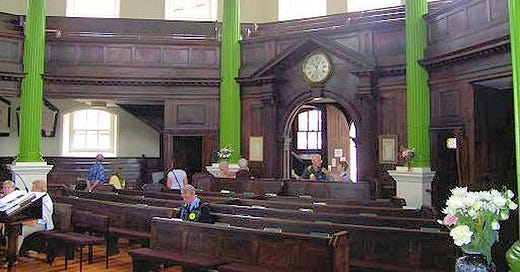Hi folks! I’m back from two weeks of intensive classes - and wow, were they intense! I’ll be sharing more about them in the coming weeks, but for now, I just want to note that in my class on the history of Christian church architecture, we talked about Octagon Chapel in Norwich, UK, which was one of the preaching halls built in 1756 for dissenters from the Church of England. Yes, the apple green is a Georgian color allowed by their version of historic site guidelines, and yes, the chapel was called “the devil’s cucumber frame” back in the day.
My brain is still full of visual analysis methods and flying buttresses and all the things I have to catch up on in my ministry after two weeks away, but what I really want to say this morning is this:
Many congregations are having annual meetings in the coming weeks.
Those meetings will include some ‘state of the congregation’ reports, some mission and vision celebrations, recognition of leaders and projects and maybe some transitions. Sometimes there will be policy changes or a bylaw amendment. Usually, there will be an election of officers. And, those meetings include budget approvals.
It’s the budget I want to talk about.
Those budgets usually have been reviewed in open board meetings and sometimes special budget town halls. Sometimes more than one.
WHY?
Because those board meetings and town halls are when when discussion and explanation and reasoned debate can happen, in preparation for the annual meeting.
WHY?
Because annual meetings are already long and sometimes tedious, especially if there are questions about policy or bylaw changes, or if there’s a lot of news to share (for example, if there’s a building project or a major personnel shift). And honestly, most people do not care about the fiddly points of the budget, as long as the lights stay on, staff get paid fairly, and programs are supported.
The Annual Meeting is NOT the time to renegotiate the minister’s salary, or to suggest maybe we don’t need a minister.
The Annual Meeting is NOT the time to go through and decrease by nickels and dimes the programs you don’t like in order to give a few hundred more to the one you do like.
The Annual Meeting is NOT the time to bring your quibbles about how much (if anything) we give to the UUA’s Annual Program Fund (formerly Fair Share), to support the work of the Association.
The Annual Meeting is NOT the time to suddenly freak out about spending a dime on programs because you personally had a rough year.
The Annual Meeting is NOT the one time of the year you should show up in the building or any of the events to make your displeasure with the congregation known.
The Annual Meeting is NOT the time to complain about the budget if you are a non-pledging member.
Instead…
The Annual Meeting IS the time to come having at least read the budget, and gone to the prep meetings if you cared about that (or not if you trust the people in the room).
The Annual Meeting IS the time to come having read the other material, or at least have scanned it.
The Annual Meeting IS the time to engage thoughtfully and respectfully - even if there is some disagreement.
The Annual Meeting should be a time of good congregational work and great congregational celebration.
Please do your preparation, and please be kind to one another. It’s been a really long year on top of a series of really long years, and, to quote a ten year old I know who chose to not engage in a fight with his older brother, ‘I’m too tired…. it’s just not worth it.’






Yes!! This religion says that all opinions are important, but it's okay to say, "I recognize that my opinion might be a less educated one because of my inattention or inability to participate in previous conversations. I can trust the faithful work of those faith siblings that have been involved in this process for the duration and plan to be more present and involved for next time."
Please shout this from the rooftops. Annual meetings shouldn't be ominous and dreadful. Congregations shouldn't have to spend the entire church year (or two or three) following a contentious annual meeting trying to recover from the harm caused by a congregation that elects leaders and immediately turns on them.
I know we Unitarian Universalists are descendants of Oliver Cromwell and the Roundheads who abhorred the idea of leadership. But really, it's been several centuries. Perhaps we can get past that? Perhaps we might accept that in the church when we elect people to lead we are electing people we trust. And if we don't trust them, why aren't we stepping up to lead ourselves?
Being in covenant with one another requires that we take the responsibility of membership seriously. So let's be prepared and let's celebrate at the annual meeting.